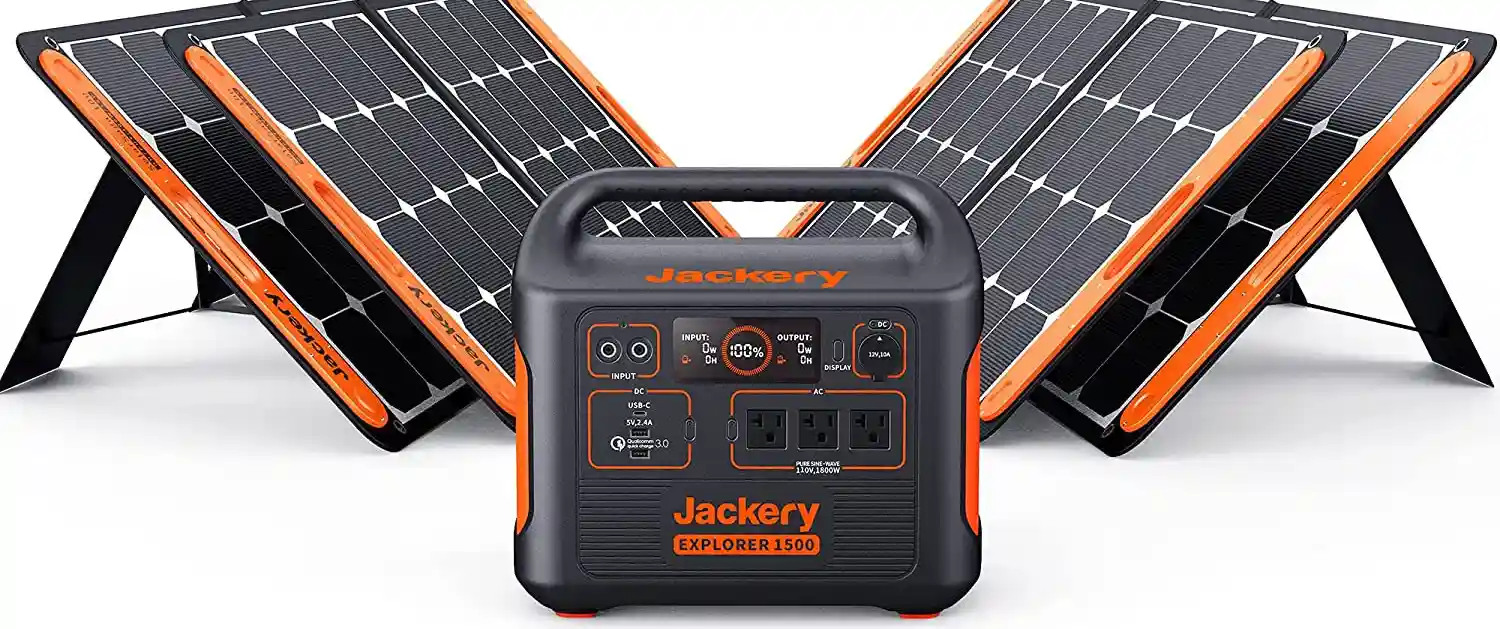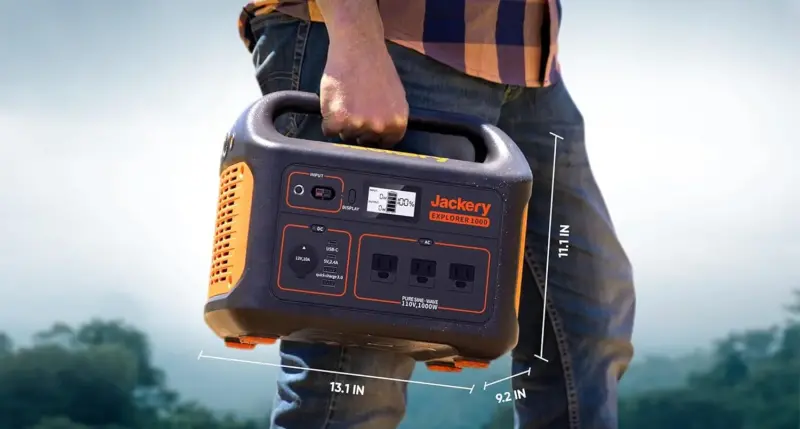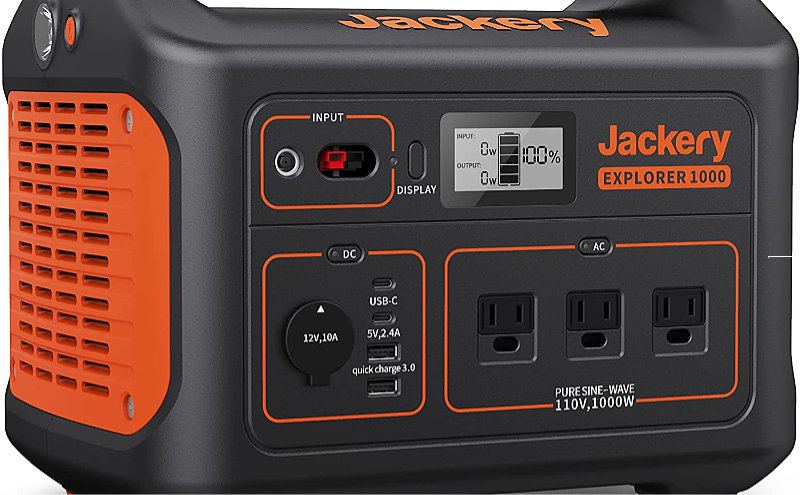Jackery versus Gas-Powered Generator (Read This First)

The Jackery versus an ordinary generator (fossil fuel-powered). Given my experience with alternative energy systems, I would like to point out a big difference between them. While there are pros and cons, there’s one particular difference between an ordinary (gas) generator and something like a Jackery Portable Power Station that I would like to mention. Or any similar energy storage device/brand that uses battery technology for energy storage. Sometimes they’re called a solar generator (because one typical charging method is with solar panels).
In other words, let’s talk about the Jackery versus a gas generator…
A fuel-powered generator (typically gasoline). Where is the energy stored? It’s in the gasoline itself. The gas. That’s the energy source. When the gas runs out, you pour more into the tank.
What about a device like the popular Jackery solar generator (portable power station). Where’s the energy? It’s stored in the battery. How does it get there? Either by plugging it into a standard AC outlet to charge, or, charge by solar panels. Vehicle accessory outlets can charge these too.
But here’s what I find particularly interesting when comparing the operation of a typical gasoline generator versus a battery storage ‘generator’ device like the Jackery…
Difference Between Jackery and Gasoline Generator
Let’s say they are both 3,000-watt generators. Yes, Jackery makes a 3,000-watt solar generator with 2kWh storage capacity…
Explorer 2000 Plus (Expandable Design)
(popular models are linked below)
(Jackery on amzn)
As you are well aware, the combustion engine within a gasoline-powered generator simply runs all the time. It makes 3,000 watts (in this example) available for consumption. It’s constantly using fuel (gas) to make that power/energy available, regardless of what’s plugged into it (the load).
Jackery vs Generator
If the plugged-in load only uses 200 watts, the gas-powered generator uses way more fuel than needed (because there are about 2,800 watts not being used, and the engine is always running). Okay, a caveat… Some generators will automatically throttle down (slow down) when there is a lower power demand. My Yamaha’s do that. However, it’s still always running, and there’s still lots of inefficiency when you compare it with what I’m going to say next…
A ‘generator’ like the Jackery (linked above for example), will make available 3,000 watts of energy. But it behaves differently than a typical gas generator. The Jackery (or equivalent) just sits there, using no fuel, essentially no energy, waiting for a load. A demand. So, when you plug in something that’s using 200 watts, the generator will provide exactly that. No more, no less. No waste.
When you shut off that load, well, the Jackery generator goes to zero. Silently waiting… So it’s efficient that way, compared to a gasoline-powered generator that keeps on guzzling gas, even with no load.
Okay, I know there are some advantages to a gasoline generator. Some provide higher power than a ‘Jackery’, for example. As long as you have fuel (gas/propane) it will keep on running and providing power. It doesn’t need to be charged back up. A battery-powered generator (like the Jackery) will require recharge after the stored energy is consumed. But that’s not my focus in this article.
Jackery Example Use (Chest Freezer or Refrigerator During Power Outage)
What got me to thinking about this? Well, one of my popular articles on the blog is about keeping a chest freezer running during a power outage (linked below). Obviously, an ordinary gasoline generator would work for this. However…
I happen to have several chest freezers and I know what the power demand is for each of those chest freezers. I’ve measured the load and consumption. It’s a lot less than you might think for a typical chest freezer (because most chest freezers are pretty efficient and well-insulated).
A device like the Jackery solar generator would work well to keep a chest freezer running – before needing a recharge. How long would depend on what model (the storage capacity of the internal battery system).
One of my mid-size chest freezers measured an accumulated consumption of 600 watt-hours (0.6kWh) during 24 hours. The Jackery model 2000 Plus (for example) can store ~2,000 watt-hours of energy. You could easily get through a three-day power outage for your chest freezer with this model. Or indefinitely if you have sufficient solar panels to keep it charged (and at least one of three sunny days). And that’s just one example.
Jackery Advantage
The Jackery has the advantage in this example. Not only is it silent and can be operated safely indoors, but the efficiency…
The compressor in a chest freezer (or refrigerator) cycles on and off throughout the day. You might say that it’s OFF half the time. When it’s cycled OFF, the Jackery energy output goes to zero and waits. Whereas a gas generator will keep running. That’s a significant and unique difference or differentiator.
It’s a simple concept, but notable. A gas generator will consume fuel even with no load on it. A Jackery (or equivalent) power station will go to zero (or almost zero if it’s turned ‘on’) when there’s no load. That’s extremely efficient vs a gas generator!
Like their competitors, there is a range of models with various storage capacities depending on your needs and applications. The more capacity, the more it will cost. They will get larger and heavier too.
The Jackery brand, founded in California during 2012, is number-one in the world for retail sales volume.
The Jackery Explorer 1000 portable power station is among their most popular models.

Notable features of the very popular Jackery 1000 include… 1,000 wat power. 1kWh capacity. (3AC outlets, 1USB-A , 1USB-A quick charge 3.0, 2USB-C PD, 1Car outlet). MPPT charge controller. Optional solar panels. Pure sine wave inverter. Pass-through charging. Comfortable carry handle. Very portable and maneuverable, light weight, and of course quiet. It will likely power ~ 90% of home appliances. So many other uses…
When purchasing through links on my site, I may earn an affiliate commission at no extra cost to you (Learn More).
View more specs and details of the Explorer 1000 at their storefront:
1,000 watt, 1kWh capacity
(amzn)
Explorer 3000 Pro (3,000 watt, 3kWh)
THEIR ENTIRE STOREFRONT on amzn
Advantages of the Jackery (or other similar generator device)

It’s 100% silent.
It’s safe to operate indoors. Therefore very convenient to plug in devices. Obviously, a gasoline generator must be outside for safety/fumes, and a power cord brought inside the home.
Many battery-powered generators can be recharged with solar panels. For example, the Jackery 2000 Plus solar charge time can be very fast. Approximately 2 hours with six 200W panels. Extrapolated to ~ 6 hours with two 200W panels. I believe this manufacturing spec is a charge of up to 80%. Suffice it to say, it’s pretty quick.
You might say that the Jackery (or similar ‘solar generators’) provide near “endless” power, provided that you have the solar panel option.
They’re much smaller and lighter in weight than a typical gas generator. Easily handled. These devices are becoming increasingly popular for use while camping or RV camping too.
The technology is constantly improving. It is an intriguing method of energy storage and delivery, for prepping and preparedness.
Yep, it’s expensive compared to most gas generators. Though my Yamaha’s were expensive! (I was willing to pay extra for their Very Quiet operation and high-quality line inverter). Similar to the Honda.
But I’m keeping an eye on this battery technology and the adaptation to generators.
Battery Generator Portable Power Stations – Watt Hours Explained… (Wh)
How To Keep Chest Freezer or Fridge Running During Power Outage
[ Read: ‘Kill A Watt Meter’ — How to Measure Power Consumption (kWh) ]
[ Read: Compact Refrigerator Freezer For Solar Power Energy System ]
